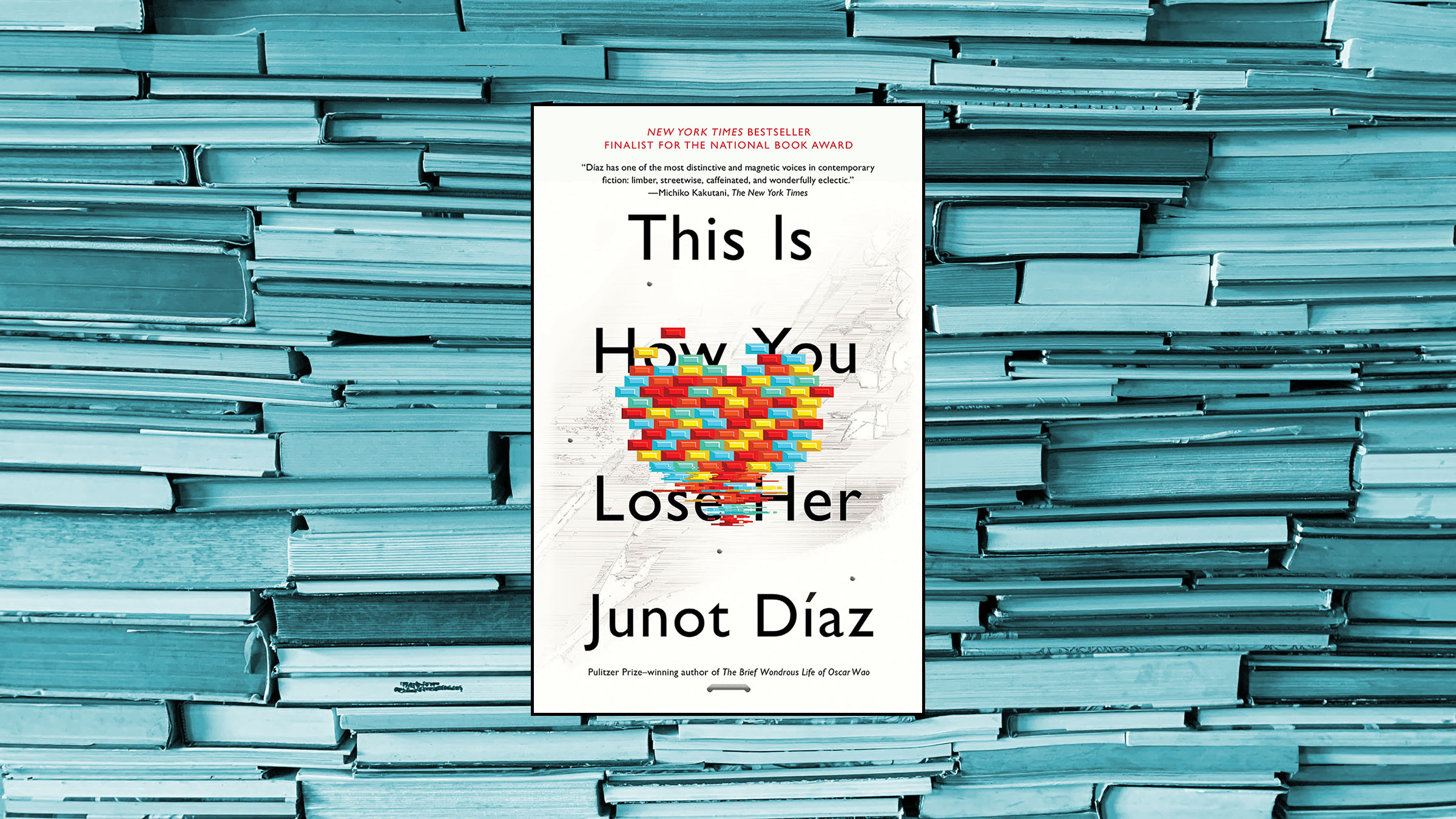Each month, American Express Essentials highlights one definitive literary work, old or new, and across any and all genres. The only determinant is quality: a book that makes life more vivid, more inspiring – a gifted piece of work you want to share. An absolute must-read.
Up this month is an achingly beautiful collection of short stories about love and machismo: This Is How You Lose Her by Junot Díaz.
In This Is How You Lose Her, Dominican-American writer Junot Díaz has crafted a raw and unflinching exploration of love’s complexities through the lens of his recurring protagonist, Yunior de Las Casas. Building upon the groundwork laid in his earlier works, particularly his 1996 short story collection Drown, Díaz delves deep into the intricacies of romantic relationships, portraying them as a battlefield where victories and losses intertwine with his characters’ profound emotional foibles.
Within the compact confines of nine short stories, the collection offers a narrative that resonates far beyond its pages, challenging readers to confront the raw, often painful realities of love and loss. While the prose flows effortlessly, don’t mistake this slim volume for light reading: each story packs an enormous punch, leaving an indelible mark on the heart and mind of the reader.
Díaz masterfully – even genially – navigates the complex terrain that is Latin American and Caribbean patriarchy, presenting readers a uniquely insightful exploration of the culture and its silent societal structures. Díaz’s deep-seated (and self-admitted) obsession with the subject is palpable throughout his stories, as he peels back the devastating yet commonplace layers of cultural norms and expectations with a precision and sensitivity that’s, truth be told, unmatched by his peers.
Through his portrayal of everyday life, Díaz submits a stark and unflinching depiction of the ways in which patriarchy shapes and defines interpersonal relationships in Latino culture, often with devastating consequences. As readers immerse themselves in the narratives, they are confronted with the harsh realities of love and loss, compelled to confront the uncomfortable truths that lie at the heart of Díaz’s exploration. This Is How You Lose Her feels, in a way, like Díaz is opening the veins of his culture and bleeding it onto the page.
Despite the absence of traditional action-driven plots – don’t go into it expecting gun fights, bank heists or drug cartels – this collection pulsates with a visceral passion, with emotion. While some might argue that nothing of substance really happens, Díaz deftly demonstrates that the human heart, and its intricacies, can be just as riveting, if not more so, than any external conflict. He lays bare the raw intensity of intimate relationships. Through his masterful storytelling and world-building, Díaz challenges readers to recognize the inherent drama and significance of the emotional landscapes we all navigate in our daily lives. After all, isn’t lost love one of the worst things that can happen to a person?
As for the topic of love, well, let’s hope you’re not a complete hopeless romantic or this book might leave you broken. For Yunior, and for nearly every character in this collection of stories, love does not necessarily equal fidelity, or even respect. There’s cheating, lots of it – one of the arguably best stories is even titled “The Cheater’s Guide to Love”. Settling for less than one deserves, succumbing to societal pressures, yearning and unrequited desires are recurrent motifs that underscore the tumultuous nature of relationships portrayed in the book. Don’t expect love to be a white and black affair, at least not here.
Indeed, Díaz ventures boldly into the intricate landscape of love, offering readers an unfiltered glimpse into the lives of the men and women navigating the multifaceted terrain of emotional and physical intimacy. His firsthand understanding of the male, immigrant and Latino experiences make both Díaz, as a writer, and his character Yunior impossible to draw away from. As readers immerse themselves in the stories, oftentimes interconnected and woven throughout the collection, they are confronted with the stark realities of machismo and how it can shape the actions and relationships of men like Yunior, often with profound repercussions.
Through his perspective, Diaz gives us a glimpse into the lives of a community of people navigating the complexities of love – from the emotional side as well as the physical. Beware, this book can get a little vulgar from time to time. It’s nothing too scandalous, but something readers should be aware of. Yunior is a player, there’s no way around it. He knows it, the women in his life know it. He struggles to keep himself together even when he wants to, even when he knows he’ll be destroyed by regret and sorrow if he doesn’t. Yet something keeps him from it, something deep and unknown perhaps even to him. It’s self-destruction at its finest, and Díaz just knows how to capture it. Some of the truths revealed in this book are hard to stomach, so be prepared to face them.
Another clear strength of Díaz’s writing? His ability to build compelling, complex characters. At the forefront stands, of course, Yunior, a recurring presence throughout Díaz’s literary universe, first introduced to readers as he comes of age in Drown. With each new appearance, the writer peels back another layer of Yunior’s persona, revealing a character who evolves and transforms before your eyes, gradually emerging as a figure imbued with vulnerability and humanity, thus defying easy categorisation. As a reader, you’re left with no choice but to see him, even if sometimes his choices leave you speechless. As he confronts the consequences of his actions, every discerning reader will be compelled to reassess their perceptions, and to accept Yunior’s own words: “I’m not a bad guy. I know how that sounds – defensive, unscrupulous – but it’s true. I’m like everyone else – weak, full of mistakes, but basically good.” Human nature, indeed.
And, of course, he’s not the only compelling character this book has to reveal. As the reader bears witness to Yunior’s tumultuous relationships and their aftermath, the women who populate Yunior’s world, his sucias, are also rendered with equal depth and complexity, serving as resonant reflections of their flawed community and the myriad forces that shape their lives. From charming and endearing to strong-willed and admirable, some (if not most) of the female characters in This Is How You Lose Her are likely to capture your heart. Under Díaz’s pen, the women in Yunior’s life come to life as fully realised individuals, each possessing their own unique strengths, weaknesses and desires. Sometimes you want to hold their hand (“She’s sensitive, too. Takes to hurt the way water takes to paper.”), sometimes you want to shake some sense into them. If that’s not the mark of a great writer, then what is?
Further Reading
If you’re eager to delve deeper into the character of Yunior, don’t overlook Drown, in which Yunior makes inaugural appearance, as well as The Brief Wondrous Life of Oscar Wao“, for which Díaz earned the Pulitzer Prize. If it’s the vibrant setting that piques your interest, consider picking up Julia Alvarez’s In the Time of the Butterflies, which recounts the tragic story of the Mirabal sisters in the Dominican Republic. And if you haven’t already had the pleasure, and are keen to immerse yourself further in Latino culture, Sandra Cisneros’ The House on Mango Street is a beautifully crafted coming-of-age novel that promises to capture your imagination.














Sorry, the comment form is closed at this time.